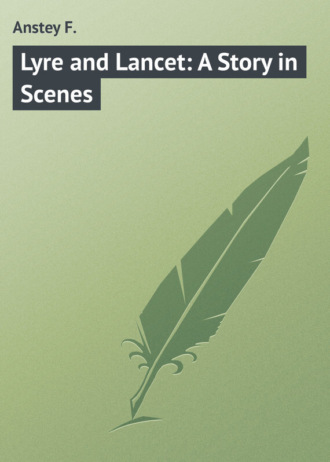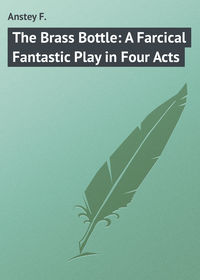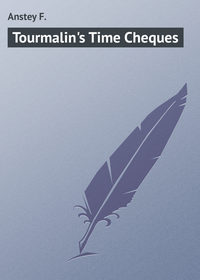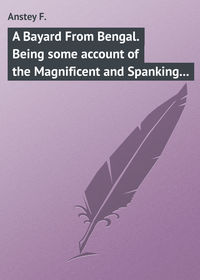 полная версия
полная версияLyre and Lancet: A Story in Scenes

F. Anstey
Lyre and Lancet: A Story in Scenes
PART I
SHADOWS CAST BEFORE
In Sir Rupert Culverin's Study at Wyvern Court. It is a rainy Saturday morning in February. Sir Rupert is at his writing-table, as Lady Culverin enters with a deprecatory air.
Lady Culverin. So here you are, Rupert! Not very busy, are you? I won't keep you a moment. (She goes to a window.) Such a nuisance it's turning out wet, with all these people in the house, isn't it?
Sir Rupert. Well, I was thinking that, as there's nothing doing out of doors, I might get a chance to knock off some of these confounded accounts, but – (resignedly) – if you think I ought to go and look after —
Lady Culverin. No, no; the men are playing billiards, and the women are in the morning-room —they're all right. I only wanted to ask you about to-night. You know the Lullingtons, and the dear Bishop and Mrs. Rodney, and one or two other people are coming to dinner? Well, who ought to take in Rohesia?
Sir Rupert (in dismay). Rohesia! No idea she was coming down this week!
Lady Culverin. Yes, by the 4.45. With dear Maisie. Surely you knew that?
Sir Rupert. In a sort of way; didn't realize it was so near, that's all.
Lady Culverin. It's some time since we had her last. And she wanted to come. I didn't think you would like me to write and put her off.
Sir Rupert. Put her off? Of course I shouldn't, Albinia. If my only sister isn't welcome at Wyvern at any time – I say at any time – where the deuce is she welcome?
Lady Culverin. I don't know, dear Rupert. But – but about the table?
Sir Rupert. So long as you don't put her near me – that's all I care about.
Lady Culverin. I mean – ought I to send her in with Lord Lullington, or the Bishop?
Sir Rupert. Why not let 'em toss up? Loser gets her, of course.
Lady Culverin. Rupert! As if I could suggest such a thing to the Bishop! I suppose she'd better go in with Lord Lullington – he's Lord Lieutenant – and then it won't matter if she does advocate Disestablishment. Oh, but I forgot; she thinks the House of Lords ought to be abolished too!
Sir Rupert. Whoever takes Rohesia in is likely to have a time of it. Talked poor Cantire into his tomb a good ten years before he was due there. Always lecturing, and domineering, and laying down the law, as long as I can remember her. Can't stand Rohesia – never could!
Lady Culverin. I don't think you ought to say so, really, Rupert. And I'm sure I get on very well with her – generally.
Sir Rupert. Because you knock under to her.
Lady Culverin. I'm sure I don't, Rupert – at least, no more than everybody else. Dear Rohesia is so strong-minded and advanced and all that, she takes such an interest in all the new movements and things, that she can't understand contradiction; she is so democratic in her ideas, don't you know.
Sir Rupert. Didn't prevent her marrying Cantire. And a democratic Countess – it's downright unnatural!
Lady Culverin. She believes it's her duty to set an example and meet the People half-way. That reminds me – did I tell you Mr. Clarion Blair is coming down this evening, too? – only till Monday, Rupert.
Sir Rupert. Clarion Blair! never heard of him.
Lady Culverin. I suppose I forgot. Clarion Blair isn't his real name, though; it's only a – an alias.
Sir Rupert. Don't see what any fellow wants with an alias. What is his real name?
Lady Culverin. Well, I know it was something ending in "ell," but I mislaid his letter. Still, Clarion Blair is the name he writes under; he's a poet, Rupert, and quite celebrated, so I'm told.
Sir Rupert (uneasily). A poet! What on earth possessed you to ask a literary fellow down here? Poetry isn't much in our way; and a poet will be, confoundedly!
Lady Culverin. I really couldn't help it, Rupert. Rohesia insisted on my having him to meet her. She likes meeting clever and interesting people. And this Mr. Blair, it seems, has just written a volume of verses which are finer than anything that's been done since – well, for ages!
Sir Rupert. What sort of verses?
Lady Culverin. Well, they're charmingly bound. I've got the book in the house, somewhere. Rohesia told me to send for it; but I haven't had time to read it yet.
Sir Rupert. Shouldn't be surprised if Rohesia hadn't, either.
Lady Culverin. At all events, she's heard it talked about. The young man's verses have made quite a sensation; they're so dreadfully clever and revolutionary, and morbid and pessimistic, and all that, so she made me promise to ask him down here to meet her!
Sir Rupert. Devilish thoughtful of her.
Lady Culverin. Wasn't it? She thought it might be a valuable experience for him; he's sprung, I believe, from quite the middle-class.
Sir Rupert. Don't see myself why he should be sprung on us. Why can't Rohesia ask him to one of her own places?
Lady Culverin. I dare say she will, if he turns out to be quite presentable. And, of course, he may, Rupert, for anything we can tell.
Sir Rupert. Then you've never seen him yourself! How did you manage to ask him here, then?
Lady Culverin. Oh, I wrote to him through his publishers. Rohesia says that's the usual way with literary persons one doesn't happen to have met. And he wrote to say he would come.
Sir Rupert. So we're to have a morbid revolutionary poet staying in the house, are we? He'll come down to dinner in a flannel shirt and no tie – or else a red one – if he don't bring down a beastly bomb and try to blow us all up! You'll find you've made a mistake, Albinia, depend upon it.
Lady Culverin. Dear Rupert, aren't you just a little bit narrow? You forget that nowadays the very best houses are proud to entertain Genius – no matter what their opinions and appearance may be. And besides, we don't know what changes may be coming. Surely it is wise and prudent to conciliate the clever young men who might inflame the masses against us. Rohesia thinks so; she says it may be our only chance of stemming the rising tide of Revolution, Rupert!
Sir Rupert. Oh, if Rohesia thinks a revolution can be stemmed by asking a few poets down from Saturday to Monday, she might do her share of the stemming at all events.
Lady Culverin. But you will be nice to him, Rupert, won't you?
Sir Rupert. I don't know that I'm in the habit of being uncivil to any guest of yours in this house, my dear, but I'll be hanged if I grovel to him, you know; the tide ain't as high as all that. But it's an infernal nuisance, 'pon my word it is; you must look after him yourself. I can't. I don't know what to talk to geniuses about; I've forgotten all the poetry I ever learnt. And if he comes out with any of his Red Republican theories in my hearing, why —
Lady Culverin. Oh, but he won't, dear. I'm certain he'll be quite mild and inoffensive. Look at Shakespeare – the bust, I mean – and he began as a poacher!
Sir Rupert. Ah, and this chap would put down the Game Laws if he could, I dare say; do away with everything that makes the country worth living in. Why, if he had his way, Albinia, there wouldn't be —
Lady Culverin. I know, dear, I know. And you must make him see all that from your point. Look, the weather really seems to be clearing a little. We might all of us get out for a drive or something after lunch. I would ride, if Deerfoot's all right again; he's the only horse I ever feel really safe upon, now.
Sir Rupert. Sorry, my dear, but you'll have to drive then. Adams tells me the horse is as lame as ever this morning, and he don't know what to make of it. He suggested having Horsfall over, but I've no faith in the local vets myself, so I wired to town for old Spavin. He's seen Deerfoot before, and we could put him up for a night or two. (To Tredwell, the butler, who enters with a telegram.) Eh, for me? just wait, will you, in case there's an answer. (As he opens it.) Ah, this is from Spavin – h'm, nuisance! "Regret unable to leave at present, bronchitis, junior partner could attend immediately if required. – Spavin." Never knew he had a partner.
Tredwell. I did hear, Sir Rupert, as Mr. Spavin was looking out for one quite recent, being hasthmatical, m'lady, and so I suppose this is him as the telegram alludes to.
Sir Rupert. Very likely. Well, he's sure to be a competent man. We'd better have him, eh, Albinia?
Lady Culverin. Oh yes, and he must stay till Deerfoot's better. I'll speak to Pomfret about having a room ready in the East Wing for him. Tell him to come by the 4.45, Rupert. We shall be sending the omnibus in to meet that.
Sir Rupert. All right, I've told him. (Giving the form to Tredwell.) See that that's sent off at once, please. (After Tredwell has left.) By the way, Albinia, Rohesia may kick up a row if she has to come up in the omnibus with a vet, eh?
Lady Culverin. Goodness, so she might! but he needn't go inside. Still, if it goes on raining like this – I'll tell Thomas to order a fly for him at the station, and then there can't be any bother about it.
PART II
SELECT PASSAGES FROM A COMING POET
In the Morning Room at Wyvern. Lady Rhoda Cokayne, Mrs. Brooke-Chatteris, and Miss Vivien Spelwane are comfortably established near the fireplace. The Hon. Bertie Pilliner, Captain Thicknesse, and Archie Bearpark, have just drifted in.
Miss Spelwane. Why, you don't mean to say you've torn yourselves away from your beloved billiards already? Quite wonderful!
Bertie Pilliner. It's too horrid of you to leave us to play all by ourselves! We've all got so cross and fractious we've come in here to be petted!
[He arranges himself at her feet, so as to exhibit a very neat pair of silk socks and pumps.Captain Thicknesse (to himself). Do hate to see a fellow come down in the mornin' with evenin' shoes on!
Archie Bearpark (to Bertie Pilliner). You speak for yourself, Pilliner. I didn't come to be petted. Came to see if Lady Rhoda wouldn't come and toboggan down the big staircase on a tea-tray. Do! It's clinkin' sport!
Captain Thicknesse (to himself). If there's one thing I can't stand, it's a rowdy bullyraggin' ass like Archie!
Lady Rhoda Cokayne. Ta muchly, dear boy, but you don't catch me travellin' downstairs on a tea-tray twice– it's just a bit too clinkin', don't you know!
Archie Bearpark (disappointed). Why, there's a mat at the bottom of the stairs! Well, if you won't, let's get up a cushion fight, then. Bertie and I will choose sides. Pilliner, I'll toss you for first pick up – come out of that, do.
Bertie Pilliner (lazily). Thanks, I'm much too comfy where I am. And I don't see any point in romping and rumpling one's hair just before lunch.
Archie Bearpark. Well, you are slack. And there's a good hour still before lunch. Thicknesse, you suggest something, there's a dear old chap.
Captain Thicknesse (after a mental effort). Suppose we all go and have another look round at the gees – eh, what?
Bertie Pilliner. I beg to oppose. Do let's show some respect for the privacy of the British hunter. Why should I go and smack them on their fat backs, and feel every one of their horrid legs twice in one morning? I shouldn't like a horse coming into my bedroom at all hours to smack me on the back. I should hate it!
Mrs. Brooke-Chatteris. I love them – dear things! But still, it's so wet, and it would mean going up and changing our shoes too – perhaps Lady Rhoda —
[Lady Rhoda flatly declines to stir before lunch.Captain Thicknesse (resentfully). Only thought it was better than loafin' about, that's all. (To himself.) I do bar a woman who's afraid of a little mud. (He saunters up to Miss Spelwane and absently pulls the ear of a Japanese spaniel on her knee.) Poo' little fellow, then!
Miss Spelwane. Poor little fellow? On my lap!
Captain Thicknesse. Oh, it – ah – didn't occur to me that he was on your lap. He don't seem to mind that.
Miss Spelwane. No? How forbearing of him! Would you mind not standing quite so much in my light? I can't see my work.
Captain Thicknesse (to himself, retreating). That girl's always fishin' for compliments. I didn't rise that time, though. It's precious slow here. I've a good mind to say I must get back to Aldershot this afternoon.
[He wanders aimlessly about the room; Archie Bearpark looks out of window with undisguised boredom.Lady Rhoda. I say, if none of you are goin' to be more amusin' than this, you may as well go back to your billiards again.
Bertie Pilliner. Dear Lady Rhoda, how cruel of you! You'll have to let me stay. I'll be so good. Look here, I'll read aloud to you. I can– quite prettily. What shall it be? You don't care? No more do I. I'll take the first that comes. (He reaches for the nearest volume on a table close by.) How too delightful! Poetry – which I know you all adore.
[He turns over the leaves.Lady Rhoda. If you ask me, I simply loathe it.
Bertie Pilliner. Ah, but then you never heard me read it, you know. Now, here is a choice little bit, stuck right up in a corner, as if it had been misbehaving itself. "Disenchantment" it's called.
[He reads."My Love has sicklied unto Loath,And foul seems all that fair I fancied —The lily's sheen a leprous growth,The very buttercups are rancid!"Archie Bearpark. Jove! The Johnny who wrote that must have been feelin' chippy!
Bertie Pilliner. He gets cheaper than that in the next poem. This is his idea of "Abasement."
[He reads."With matted head a-dabble in the dust,And eyes tear-sealèd in a saline crust,I lie all loathly in my rags and rust —Yet learn that strange delight may lurk in self-disgust."Now, do you know, I rather like that – it's so deliciously decadent!
Lady Rhoda. I should call it utter rot, myself.
Bertie Pilliner (blandly). Forgive me, Lady Rhoda. "Utterly rotten," if you like, but not "utter rot." There's a difference, really. Now, I'll read you a quaint little production which has dropped down to the bottom of the page, in low spirits, I suppose. "Stanza written in Depression near Dulwich."
[He reads."The lark soars up in the air;The toad sits tight in his hole;And I would I were certain which of the pairWere the truer type of my soul!"Archie Bearpark. I should be inclined to back the toad, myself.
Miss Spelwane. If you must read, do choose something a little less dismal. Aren't there any love songs?
Bertie Pilliner. I'll look. Yes, any amount – here's one. (He reads.) "To My Lady."
"Twine, lanken fingers lily-lithe,Gleam, slanted eyes all beryl-green,Pout, blood-red lips that burst awrithe,Then – kiss me, Lady Grisoline!"Miss Spelwane (interested). So that's his type. Does he mention whether she did kiss him?
Bertie Pilliner. Probably. Poets are always privileged to kiss and tell. I'll see … h'm, ha, yes; he does mention it … I think I'll read something else. Here's a classical specimen.
[He reads."Uprears the monster now his slobberous head,Its filamentous chaps her ankles brushing;Her twice-five roseal toes are cramped in dread,Each maidly instep mauven-pink is flushing."And so on, don't you know… Now I'll read you a regular rouser called "A Trumpet Blast." Sit tight, everybody!
[He reads."Pale Patricians, sunk in self-indulgence, (One for you, dear Archie!)Blink your blearèd eyes. (Blink, pretty creatures, blink!) Behold the Sun —Burst proclaim, in purpurate effulgence,Demos dawning, and the Darkness – done!"[General hilarity, amidst which Lady Culverin enters.Lady Culverin. So glad you all contrive to keep your spirits up, in spite of this dismal weather. What is it that's amusing you all so much, eh, dear Vivien?
Miss Spelwane. Bertie Pilliner has been reading aloud to us, dear Lady Culverin —the most ridiculous poetry – made us all simply shriek. What's the name of it? (Taking the volume out of Bertie's hand.) Oh, Andromeda, and other Poems. By Clarion Blair.
Lady Culverin (coldly). Bertie Pilliner can turn everything into ridicule, we all know; but probably you are not aware that these particular poems are considered quite wonderful by all competent judges. Indeed, my sister-in-law —
All (in consternation). Lady Cantire! Is she the author? Oh, of course, if we'd had any idea —
Lady Culverin. I've no reason to believe that Lady Cantire ever composed any poetry. I was only going to say that she was most interested in the author, and as she and my niece Maisie are coming to us this evening —
Miss Spelwane. Dear Lady Culverin, the verses are quite, quite beautiful; it was only the way they were read.
Lady Culverin. I am glad to hear you say so, my dear, because I'm also expecting the pleasure of seeing the author here, and you will probably be his neighbour to-night. I hope, Bertie, that you will remember that this young man is a very distinguished genius; there is no wit that I can discover in making fun of what one doesn't happen to understand.
[She passes on.Bertie (plaintively, after Lady Culverin has left the room). May I trouble somebody to scrape me up? I'm pulverised! But really, you know, a real live poet at Wyvern! I say, Miss Spelwane, how will you like to have him dabbling his matted head next to you at dinner, eh?
Miss Spelwane. Perhaps I shall find a matted head more entertaining than a smooth one. And, if you've quite done with that volume, I should like to have a look at it.
[She retires with it to her room.Archie (to himself). I'm not half sorry this Poet-johnny's comin'; I never caught a Bard in a booby-trap yet.
Captain Thicknesse (to himself). She's coming – this very evenin'! And I was nearly sayin' I must get back to Aldershot!
Lady Rhoda. So Lady Cantire's comin'; we shall all have to be on our hind legs now! But Maisie's a dear thing. Do you know her, Captain Thicknesse?
Captain Thicknesse. I – I used to meet Lady Maisie Mull pretty often at one time; don't know if she'll remember it, though.
Lady Rhoda. She'll love meetin' this writin' man – she's so fearfully romantic. I heard her say once that she'd give anythin' to be idealized by a great poet – sort of – what's their names – Petrarch and Beatrice business, don't you know. It will be rather amusin' to see whether it comes off – won't it?
Captain Thicknesse (choking). I – ah – no affair of mine, really. (To himself.) I'm not intellectual enough for her, I know that. Suppose I shall have to stand by and look on at the Petrarchin'. Well, there's always Aldershot!
[The luncheon gong sounds, to the general relief and satisfaction.PART III
THE TWO ANDROMEDAS
Opposite a Railway Bookstall at a London Terminus. Time —Saturday, 4.25 P.M.
Drysdale (to his friend, Galfrid Undershell, whom he is "seeing off"). Twenty minutes to spare; time enough to lay in any quantity of light literature.
Undershell (in a head voice). I fear the merely ephemeral does not appeal to me. But I should like to make a little experiment. (To the Bookstall Clerk.) A – do you happen to have a copy left of Clarion Blair's Andromeda?
Clerk. Not in stock, sir. Never 'eard of the book, but dare say I could get it for you. Here's a Detective Story we're sellin' like 'ot cakes —The Man with the Missing Toe– very cleverly written story, sir.
Undershell. I merely wished to know – that was all. (Turning with resigned disgust to Drysdale.) Just think of it, my dear fellow. At a bookstall like this one feels the pulse, as it were, of Contemporary Culture; and here my Andromeda, which no less an authority than the Daily Chronicle hailed as the uprising of a new and splendid era in English Song-making, a Poetic Renascence, my poor Andromeda, is trampled underfoot by – (choking) – Men with Missing Toes! What a satire on our so-called Progress!
Drysdale. That a purblind public should prefer a Shilling Shocker for railway reading when for a modest half-guinea they might obtain a numbered volume of Coming Poetry on hand-made paper! It does seem incredible, – but they do. Well, if they can't read Andromeda on the journey, they can at least peruse a stinger on it in this week's Saturday. Seen it?
Undershell. No. I don't vex my soul by reading criticisms on my work. I am no Keats. They may howl – but they will not kill me. By the way, the Speaker had a most enthusiastic notice last week.
Drysdale. So you saw that then? But you're right not to mind the others. When a fellow's contrived to hang on to the Chariot of Fame, he can't wonder if a few rude and envious beggars call out "Whip behind!" eh? You don't want to get in yet? Suppose we take a turn up to the end of the platform.
[They do.James Spurrell, M.R.C.V.S., enters with his friend, Thomas Tanrake, of Hurdell and Tanrake, Job and Riding Masters, Mayfair.
Spurrell. Yes, it's lucky for me old Spavin being laid up like this – gives me a regular little outing, do you see? going down to a swell place like this Wyvern Court, and being put up there for a day or two! I shouldn't wonder if they do you very well in the housekeeper's room. (To Clerk.) Give me a Pink Un and last week's Dog Fancier's Guide.
Clerk. We've returned the unsold copies, sir. Could give you this week's; or there's The Rabbit and Poultry Breeder's Journal.
Spurrell. Oh, rabbits be blowed! (To Tanrake.) I wanted you to see that notice they put in of Andromeda and me, with my photo and all; it said she was the best bull-bitch they'd seen for many a day, and fully deserved her first prize.
Tanrake. She's a rare good bitch, and no mistake. But what made you call her such an outlandish name?
Spurrell. Well, I was going to call her Sal; but a chap at the College thought the other would look more stylish if I ever meant to exhibit her. Andromeda was one of them Roman goddesses, you know.
Tanrake. Oh, I knew that right enough. Come and have a drink before you start – just for luck – not that you want that.
Spurrell. I'm lucky enough in most things, Tom; in everything except love. I told you about that girl, you know – Emma – and my being as good as engaged to her, and then, all of a sudden, she went off abroad, and I've never seen or had a line from her since. Can't call that luck, you know. Well, I won't say no to a glass of something.









